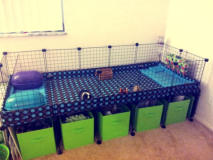NAVIGATION
CONTACT
admin@guineapigsaustralia.com.au
CAGE SIZE
The bigger the better. The area that
you provide you cavy must be as
spacious as possible. A large cage is
considered the healthiest way to
house your cavy. Cavies need at
least 70 square centimetres of cage
space or 7.5 square feet. This is the
minimum requirement that is
needed for a cavy. 76cm x 91cm of
cage space is preferred to ensure your cavy remains healthy and happy.
Male guinea pigs need at least 1 square metre of cage space, to prevent
fights over territory. If your cage is too small it may be difficult for
successful introductions.
See graph below for cage size requirements:
# of Guinea Pigs
Cage Space in Cm
Cage Space in Sqm
One
76 x 91
0.7sqm
Two
76 x 127
0.7sqm - 1sqm
Three
76 x 157
1sqm - 1.2sqm
Four
76x 193
1.2sqm - 1.3sqm
Benefits of large housing
Increase/Adequate Exercise: Guinea pigs regularly like to run and
exercise according to their own body clock. Even with time outside of
their cage a cavy will need to exercise in its own time. A large cage
ensures this is possible, and your cavy will remain fit and healthy.
Smaller cages limit exercise space and time. They do not provide ample
space for exploration and laps. It is not possible within a small housing
option to give your cavy the
exercise it requires daily, only a large cage can provide this.
Promotes Health: Cavies who receive regular exercise are less prone to
obesity related issues such as , liver, heart and respiratory distress and
disease. They are free to exercise within their own time and according
to their own schedule. Boars will also be less prone to developing
impaction problems. Numerous exotics vets agree that regular exercise
is increasingly important to ensure and prevent problems related to
impaction. By providing a large cage you are not only ensuring a fit and
healthy cavy, but are preventing future health issues.
Smaller cages do not promote a good health ethic for your guinea pig.
Not only will cavies be increasingly susceptible to obesity related issues,
but impaction problems as well. It is is in the best interests of your cavy
to ensure it is housed in adequate and suitable living quarters.
Ability to Express Natural Behaviour: Cavies need a large area to
explore, pop corn, rumblestrutt, perform laps and this requires a
certain degree of space. Smaller cages may enable a cavy to exhibit
natural behaviour however it restricts the amount of movement that
can be obtained and a cavy cannot express this behaviour to the extent
as it would in a larger environment. Guinea pigs should be given the
freedom to exhibit and effectively communicate with one another
without having objects or walls preventing this or getting in their way.
Boars also need a great deal of space to prevent fights. If your cage is
too small there will be no room for boars to have ''time out'' from each
other which could lead to injuries and blood shed. Boars must have a
minimum 1 square metre in order to retain social interactions with each
other peacefully. For the safety of you cavies it is vitally important that
they be given a large area to work out who is the dominant cavy. This
rule also applies to sows.
Easier to Clean: A large cage is easier to clean than a smaller cage. In
smaller environment mess is compacted into a tight area which can run
the risk of ammonia building up, which can cause respiratory distress.
Large cages provide owners with the ability to clean up mess effectively.
Mess is not compacted resulting in cavies not walking through their
own waste, which is unhealthy.
Provides Mental Stimulation: Large cages can provide cavies with the
space to play, popcorn, and not to be confined to a small boring
environment. Small cages limit the amount of accessories you can add,
you do not have the ability to change them around or add extra
tunnels. Large housing provides owners with the adaptability of
changing the inside of their cage and cavies are not faced with a
confined space but the freedom to move around and play according to
their own schedule.
More Social:Happy healthy cavies are more social with their owners.
They will interact more as they are comfortable with their own
environment. You have decreased health issues as they are receiving
the adequate amount of exercise within their cage, resulting in less
frequent vet visits and bills.











